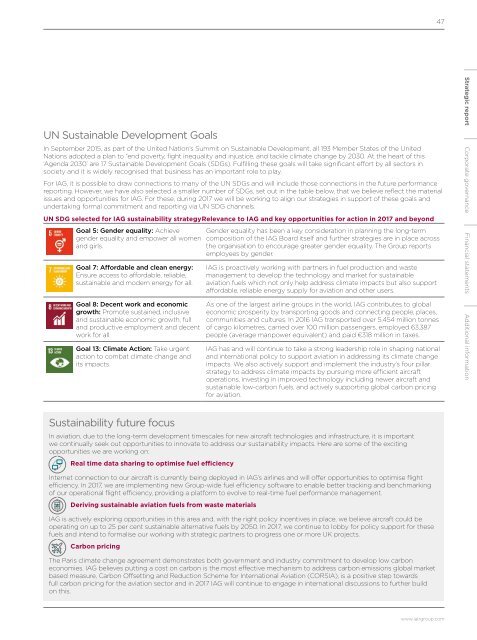Annual report and accounts 2016
Create successful ePaper yourself
Turn your PDF publications into a flip-book with our unique Google optimized e-Paper software.
47<br />
UN Sustainable Development Goals<br />
In September 2015, as part of the United Nation’s Summit on Sustainable Development, all 193 Member States of the United<br />
Nations adopted a plan to “end poverty, fight inequality <strong>and</strong> injustice, <strong>and</strong> tackle climate change by 2030. At the heart of this<br />
‘Agenda 2030’ are 17 Sustainable Development Goals (SDGs). Fulfilling these goals will take significant effort by all sectors in<br />
society <strong>and</strong> it is widely recognised that business has an important role to play.<br />
For IAG, it is possible to draw connections to many of the UN SDGs <strong>and</strong> will include those connections in the future performance<br />
<strong>report</strong>ing. However, we have also selected a smaller number of SDGs, set out in the table below, that we believe reflect the material<br />
issues <strong>and</strong> opportunities for IAG. For these, during 2017 we will be working to align our strategies in support of these goals <strong>and</strong><br />
undertaking formal commitment <strong>and</strong> <strong>report</strong>ing via UN SDG channels.<br />
UN SDG selected for IAG sustainability strategyRelevance to IAG <strong>and</strong> key opportunities for action in 2017 <strong>and</strong> beyond<br />
Goal 5: Gender equality: Achieve<br />
gender equality <strong>and</strong> empower all women<br />
<strong>and</strong> girls.<br />
Goal 7: Affordable <strong>and</strong> clean energy:<br />
Ensure access to affordable, reliable,<br />
sustainable <strong>and</strong> modern energy for all.<br />
Goal 8: Decent work <strong>and</strong> economic<br />
growth: Promote sustained, inclusive<br />
<strong>and</strong> sustainable economic growth, full<br />
<strong>and</strong> productive employment <strong>and</strong> decent<br />
work for all.<br />
Goal 13: Climate Action: Take urgent<br />
action to combat climate change <strong>and</strong><br />
its impacts.<br />
Gender equality has been a key consideration in planning the long-term<br />
composition of the IAG Board itself <strong>and</strong> further strategies are in place across<br />
the organisation to encourage greater gender equality. The Group <strong>report</strong>s<br />
employees by gender.<br />
IAG is proactively working with partners in fuel production <strong>and</strong> waste<br />
management to develop the technology <strong>and</strong> market for sustainable<br />
aviation fuels which not only help address climate impacts but also support<br />
affordable, reliable energy supply for aviation <strong>and</strong> other users.<br />
As one of the largest airline groups in the world, IAG contributes to global<br />
economic prosperity by transporting goods <strong>and</strong> connecting people, places,<br />
communities <strong>and</strong> cultures. In <strong>2016</strong> IAG transported over 5,454 million tonnes<br />
of cargo kilometres, carried over 100 million passengers, employed 63,387<br />
people (average manpower equivalent) <strong>and</strong> paid €318 million in taxes.<br />
IAG has <strong>and</strong> will continue to take a strong leadership role in shaping national<br />
<strong>and</strong> international policy to support aviation in addressing its climate change<br />
impacts. We also actively support <strong>and</strong> implement the industry’s four pillar<br />
strategy to address climate impacts by pursuing more efficient aircraft<br />
operations, investing in improved technology including newer aircraft <strong>and</strong><br />
sustainable low-carbon fuels, <strong>and</strong> actively supporting global carbon pricing<br />
for aviation.<br />
Strategic <strong>report</strong> Corporate governance Financial statements Additional information<br />
Sustainability future focus<br />
In aviation, due to the long‐term development timescales for new aircraft technologies <strong>and</strong> infrastructure, it is important<br />
we continually seek out opportunities to innovate to address our sustainability impacts. Here are some of the exciting<br />
opportunities we are working on:<br />
Real time data sharing to optimise fuel efficiency<br />
Internet connection to our aircraft is currently being deployed in IAG’s airlines <strong>and</strong> will offer opportunities to optimise flight<br />
efficiency. In 2017, we are implementing new Group-wide fuel efficiency software to enable better tracking <strong>and</strong> benchmarking<br />
of our operational flight efficiency, providing a platform to evolve to real-time fuel performance management.<br />
Deriving sustainable aviation fuels from waste materials<br />
IAG is actively exploring opportunities in this area <strong>and</strong>, with the right policy incentives in place, we believe aircraft could be<br />
operating on up to 25 per cent sustainable alternative fuels by 2050. In 2017, we continue to lobby for policy support for these<br />
fuels <strong>and</strong> intend to formalise our working with strategic partners to progress one or more UK projects.<br />
Carbon pricing<br />
The Paris climate change agreement demonstrates both government <strong>and</strong> industry commitment to develop low carbon<br />
economies. IAG believes putting a cost on carbon is the most effective mechanism to address carbon emissions global market<br />
based measure, Carbon Offsetting <strong>and</strong> Reduction Scheme for International Aviation (CORSIA), is a positive step towards<br />
full carbon pricing for the aviation sector <strong>and</strong> in 2017 IAG will continue to engage in international discussions to further build<br />
on this.<br />
www.iairgroup.com



